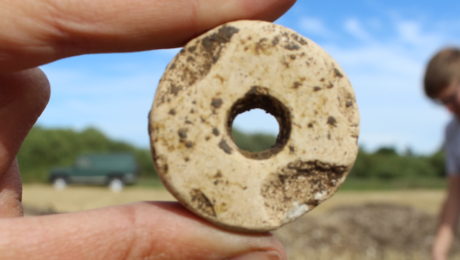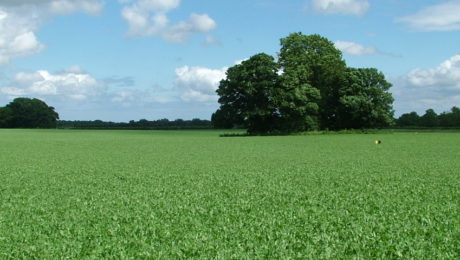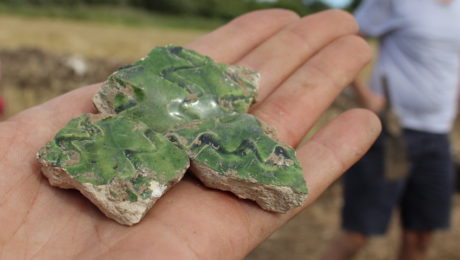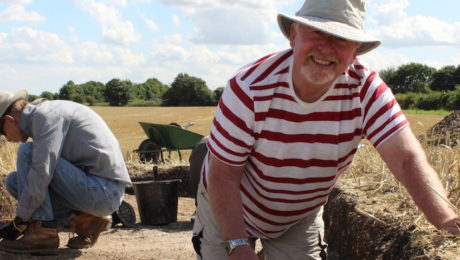Over the years, archaeologists have made some extraordinary discoveries in Yorkshire. There are deserted medieval villages, Roman coin hoards, Iron Age cemeteries, and Bronze Age burial mounds.
Located close to the Yorkshire Wolds – an area known for some remarkable archaeological discoveries dating back 6,000 years from the Neolithic right through to the late middle ages, Elmswell Farm also sits within the Hull Valley – an area that’s famous for having a distinctive ‘Arras’ Iron Age culture who buried their dead in square, rather than the typical round, barrows.
Elmswell Farm could soon make itself at home on this impressive list; it is uniquely positioned to provide a cross-section through all of these periods; its boundaries contain evidence of occupation extending all the way back from the present day to the Mesolithic. For archaeologists, there’s little more precious than a multi-period site like this, because these are the ones that really help us tie together the stories of all the different people, traditions and cultures that have come and gone over the millennia….
Pocklington, Iron Age cemetery, distance from Elmswell: 17 miles
The Arras culture is a middle Iron Age culture found in East Yorkshire. Among their most distinctive practices is their habit of burying people in square, rather than round, burial mounds – a practice which is uncommon in the rest of the country. The recently excavated site at Pocklington produced a total of 70 square barrows. Together, they contained at least 160 burials, among which were found hundreds of glass beads, dozens of brooches and several spears are only the tip of what was found amongst these graves.
But what really puts Pocklington on the map was the discovery of a rare horse and chariot burial. While Iron Age chariot burials are significant in their own right, this is the first excavation in over two centuries to have found a chariot buried with not one, but two, nearly complete horse skeletons.
Wetwang Slack, Iron Age cemetery, distance from Elmswell: 5 miles
Wetwang Slack is not only one of the most extensive Arras sites, but the biggest Middle Iron Age cemetery in the entire country. Excavations starting in the 1970s uncovered roundhouses, roads and over 450 Arras Culture burials. In 1984, archaeologists discovered three chariot burials, with some impressive grave goods including swords, an iron mirror and a possible shield.
More recent analysis has shown that one of the chariot burials was dedicated to a woman, and reconstructions of her have suggested she may have been a battle-scarred warrior.
Wold Newton, Romano-British coin hoard, distance from Elmswell: 14 miles
While East Yorkshire’s Iron Age culture is impressive, it’s also known for some hefty Roman finds. Wold Newton is home to the largest Romano-British coin hoard in Northern Britain.
This phenomenal discovery consisted of 1,857 copper coins, known as nummi, packed away in a pot. Uncovered by metal detectorists in 2014, the pot was carefully recovered with the coins left in-situ, allowing experts to remove the interred coins layer by layer. It was determined that the stash was likely buried around AD 307 as the latest coins in the hoard were issues of Constantine the Great, who died in York in AD 306.
Wharram Percy, Deserted Medieval Village, distance from Elmswell: 14 miles
Wharram Percy might technically be in North Yorkshire, but it was classed as being in the East Riding until the boundary changes in 1974. Regardless of such modern quibbles, Wharram Percy is only 14 miles away, and is notable for being one of the most significant, and best preserved, deserted medieval villages in Britain.
At its peak, it was home to around 200 people, until it was hit by the plague. Extensive excavations from the 1950s through to 1990 have provided a level of insight into medieval life unlike any other.
Elmswell Farm, multi-period site
Everything that’s been found at Elmswell Farm so far is just a hint of what might yet be found. With its very own Bronze Age barrows, ladder settlement, Roman coins, Anglo-Saxon burials and deserted medieval village, Elmswell Farm is brimming with archaeological potential.





